Unit 2 Daily life Reading (I) 课件(共31张PPT)
文档属性
| 名称 | Unit 2 Daily life Reading (I) 课件(共31张PPT) |
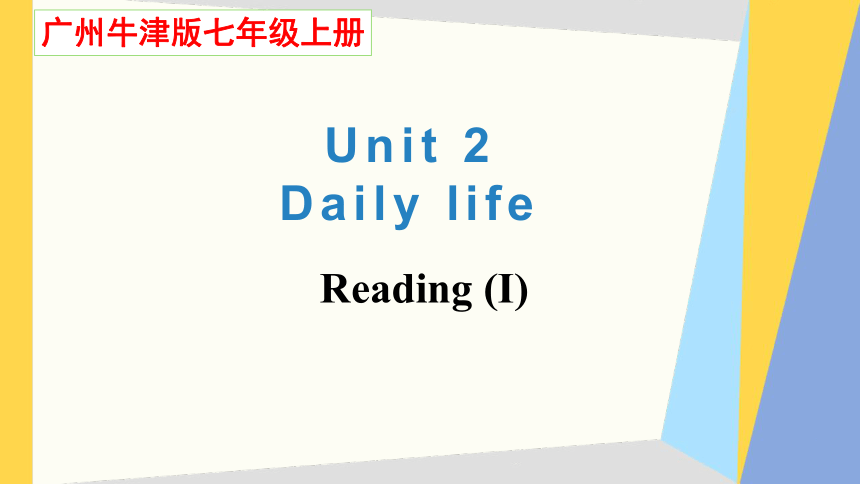
|
|
| 格式 | pptx | ||
| 文件大小 | 6.8MB | ||
| 资源类型 | 教案 | ||
| 版本资源 | 牛津深圳版 | ||
| 科目 | 英语 | ||
| 更新时间 | 2021-09-19 00:00:00 | ||
图片预览

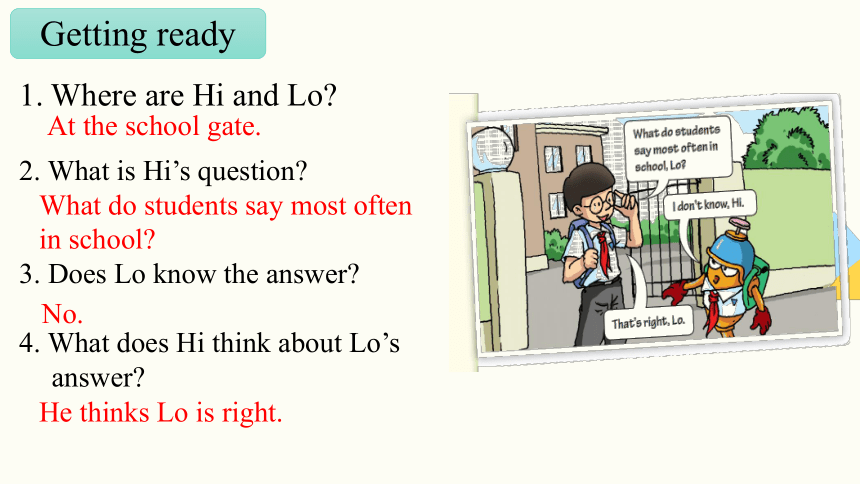
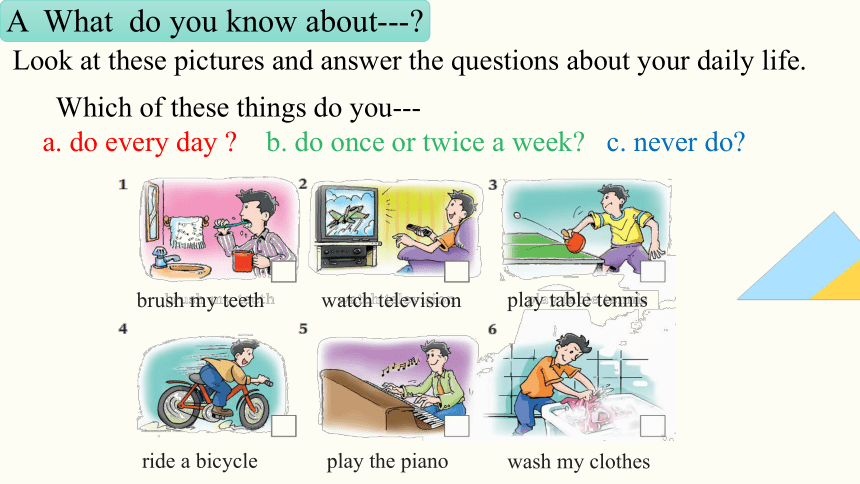
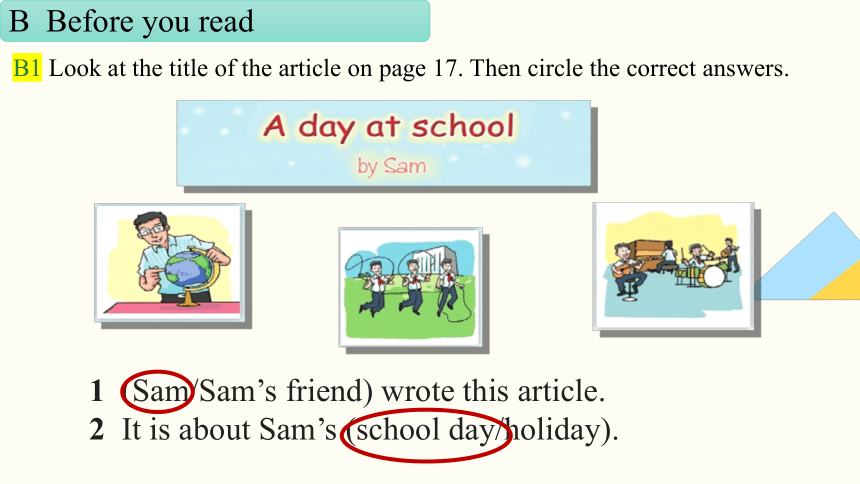
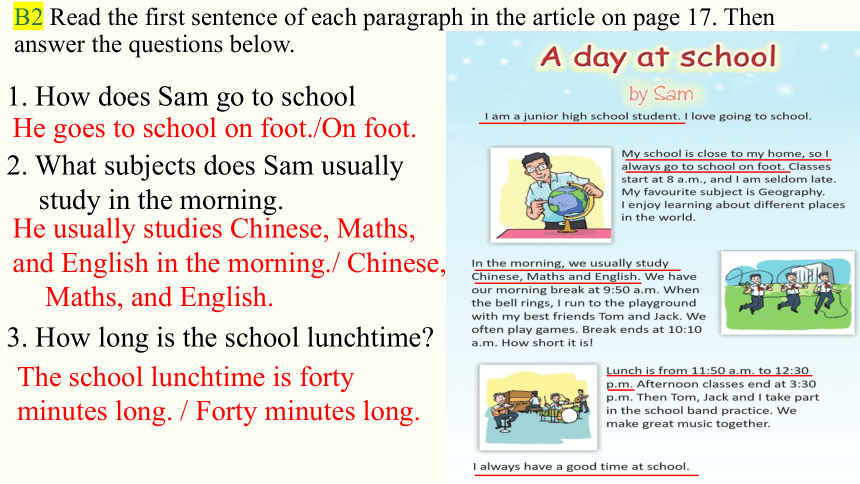
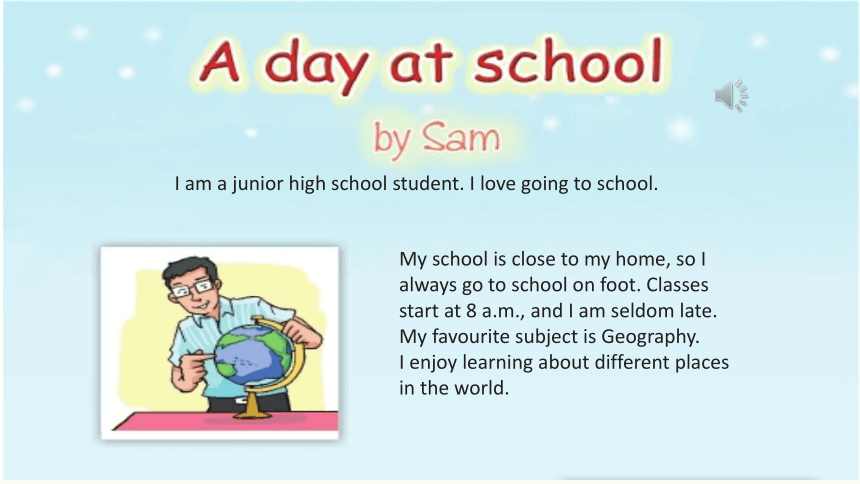
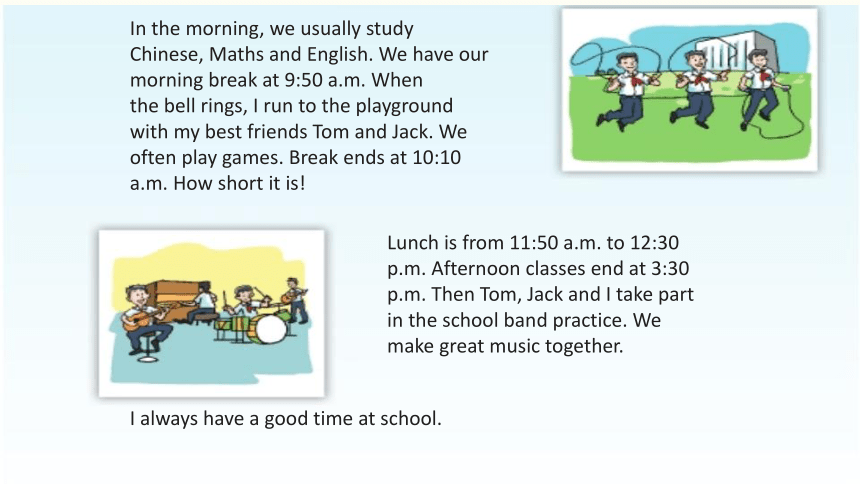
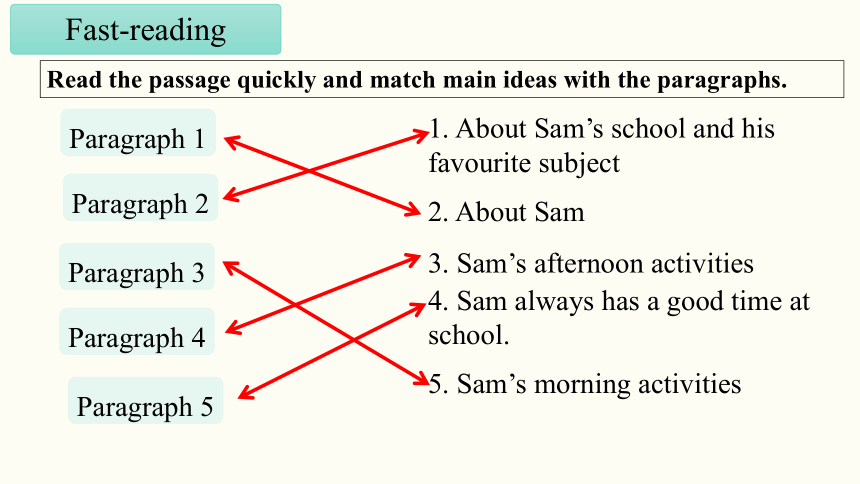
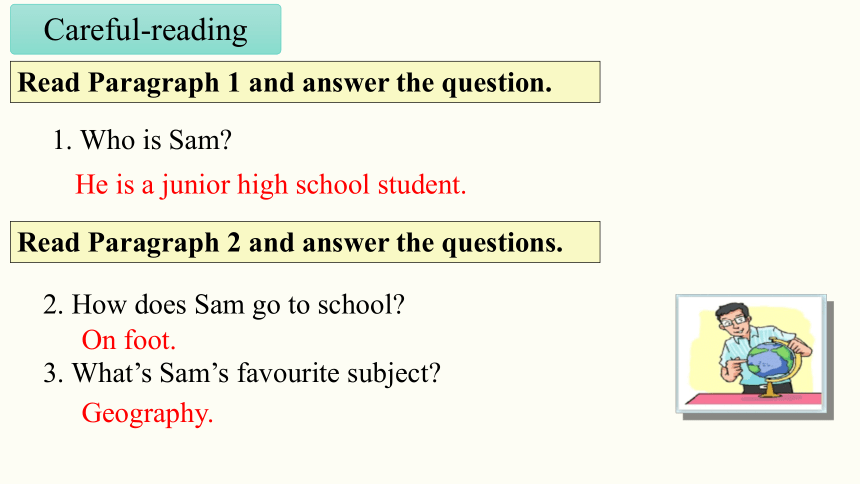
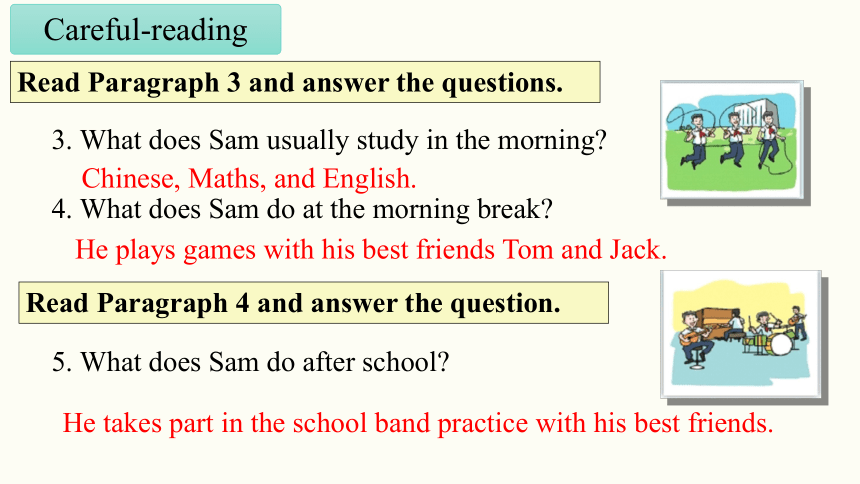
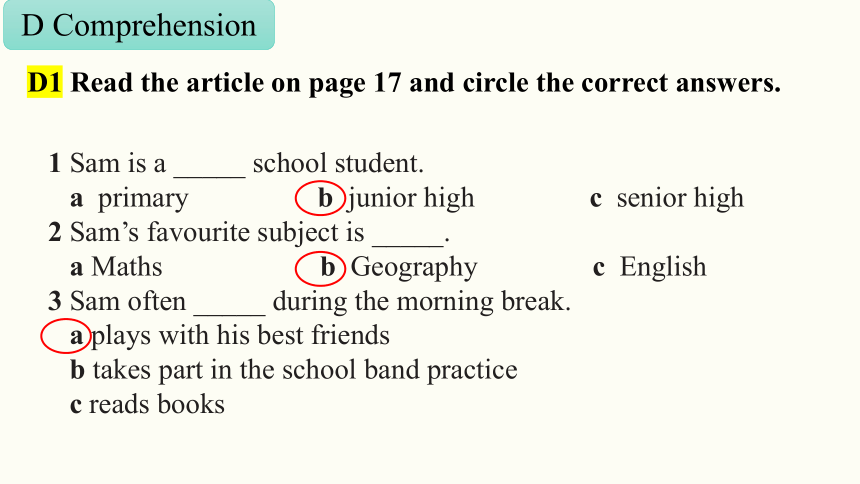
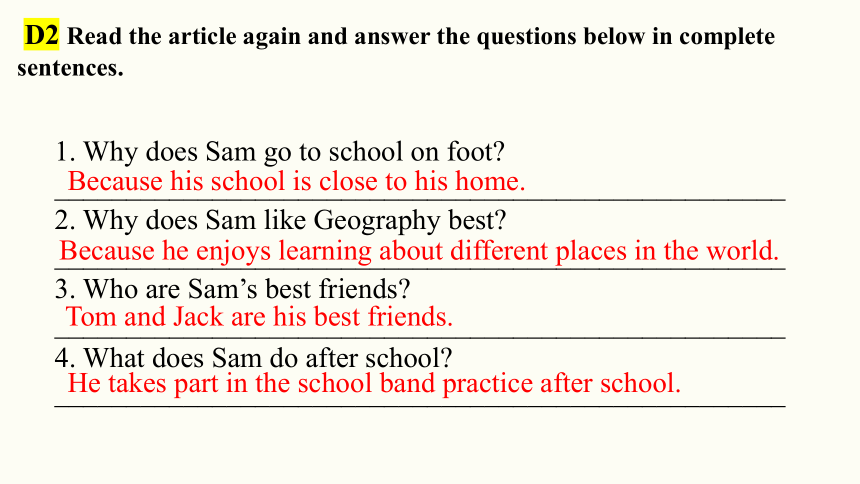
文档简介
(共31张PPT)
Unit
2
Daily
life
Reading
(I)
广州牛津版七年级上册
1.
Where
are
Hi
and
Lo?
2.
What
is
Hi’s
question?
3.
Does
Lo
know
the
answer?
4.
What
does
Hi
think
about
Lo’s
answer?
At
the
school
gate.
Getting
ready
What
do
students
say
most
often
in
school?
No.
He
thinks
Lo
is
right.
A
What
do
you
know
about---?
Look
at
these
pictures
and
answer
the
questions
about
your
daily
life.
brush
my
teeth
watch
television
play
table
tennis
ride
a
bicycle
play
the
piano
wash
my
clothes
Which
of
these
things
do
you---
a.
do
every
day
?
b.
do
once
or
twice
a
week?
c.
never
do?
B
Before
you
read
B1
Look
at
the
title
of
the
article
on
page
17.
Then
circle
the
correct
answers.
1
(Sam/Sam’s
friend)
wrote
this
article.
2
It
is
about
Sam’s
(school
day/holiday).
B2
Read
the
first
sentence
of
each
paragraph
in
the
article
on
page
17.
Then
answer
the
questions
below.
1.
How
does
Sam
go
to
school
2.
What
subjects
does
Sam
usually
study
in
the
morning.
3.
How
long
is
the
school
lunchtime?
He
goes
to
school
on
foot./On
foot.
He
usually
studies
Chinese,
Maths,
and
English
in
the
morning./
Chinese,
Maths,
and
English.
The
school
lunchtime
is
forty
minutes
long.
/
Forty
minutes
long.
I
am
a
junior
high
school
student.
I
love
going
to
school.
My
school
is
close
to
my
home,
so
I
always
go
to
school
on
foot.
Classes
start
at
8
a.m.,
and
I
am
seldom
late.
My
favourite
subject
is
Geography.
I
enjoy
learning
about
different
places
in
the
world.
In
the
morning,
we
usually
study
Chinese,
Maths
and
English.
We
have
our
morning
break
at
9:50
a.m.
When
the
bell
rings,
I
run
to
the
playground
with
my
best
friends
Tom
and
Jack.
We
often
play
games.
Break
ends
at
10:10
a.m.
How
short
it
is!
Lunch
is
from
11:50
a.m.
to
12:30
p.m.
Afternoon
classes
end
at
3:30
p.m.
Then
Tom,
Jack
and
I
take
part
in
the
school
band
practice.
We
make
great
music
together.
I
always
have
a
good
time
at
school.
Read
the
passage
quickly
and
match
main
ideas
with
the
paragraphs.
Paragraph
1
Paragraph
2
Paragraph
3
Paragraph
4
Fast-reading
Paragraph
5
1.
About
Sam’s
school
and
his
favourite
subject
2.
About
Sam
3.
Sam’s
afternoon
activities
4.
Sam
always
has
a
good
time
at
school.
5.
Sam’s
morning
activities
Careful-reading
Read
Paragraph
1
and
answer
the
question.
1.
Who
is
Sam?
He
is
a
junior
high
school
student.
Read
Paragraph
2
and
answer
the
questions.
2.
How
does
Sam
go
to
school?
3.
What’s
Sam’s
favourite
subject?
On
foot.
Geography.
Careful-reading
Read
Paragraph
3
and
answer
the
questions.
3.
What
does
Sam
usually
study
in
the
morning?
4.
What
does
Sam
do
at
the
morning
break?
Chinese,
Maths,
and
English.
Read
Paragraph
4
and
answer
the
question.
5.
What
does
Sam
do
after
school?
He
takes
part
in
the
school
band
practice
with
his
best
friends.
He
plays
games
with
his
best
friends
Tom
and
Jack.
D1
Read
the
article
on
page
17
and
circle
the
correct
answers.
D
Comprehension
1
Sam
is
a
_____
school
student.
a
primary
b
junior
high
c
senior
high
2
Sam’s
favourite
subject
is
_____.
a
Maths
b
Geography
c
English
3
Sam
often
_____
during
the
morning
break.
a
plays
with
his
best
friends
b
takes
part
in
the
school
band
practice
c
reads
books
D2
Read
the
article
again
and
answer
the
questions
below
in
complete
sentences.
Because
he
enjoys
learning
about
different
places
in
the
world.
Because
his
school
is
close
to
his
home.
Tom
and
Jack
are
his
best
friends.
1.
Why
does
Sam
go
to
school
on
foot?
___________________________________________________
2.
Why
does
Sam
like
Geography
best?
___________________________________________________
3.
Who
are
Sam’s
best
friends?
___________________________________________________
4.
What
does
Sam
do
after
school?
___________________________________________________
He
takes
part
in
the
school
band
practice
after
school.
D3
Fill
in
the
table
below
and
then
compare
your
school
day
with
Sam’s.
Follow
the
example.
Classes
in
Sam’s
school
start
at
8a.m.
Classes
in
my
school
start
at---
Sam
Me
Classes
start
at
8
a.m.
Morning
break
9:50
a.m.
-
10:10
a.m.
Lunchtime
11:50
a.m.
-
12:30
p.m.
Classes
end
at
3:30
p.m.
Homework
1.
听并跟读Reading部分,复述课文;
2.
完成课本P18
C部分的练习题。
Unit
2
Daily
life
Reading
(II)
广州牛津版七年级上册
Sam
is
a
junior
high
school
student.
He
loves
_________
to
school.
His
school
is
close
to
his
home,
so
he
always
goes
to
school
____
______.
Classes
start
at
8
a.m.
and
he
is
_______
_______
.
His
favourite
subject
is
Geography
because
he
enjoys
_______
_______
different
places
in
the
world.
In
the
morning,
they
usually
study
Chinese,
Maths
and
English.
They
have
their
morning
break
at
9:50
a.m.
When
the
bell
rings,
he
often
_____
______
with
his
best
friends
Tom
and
Jack.
Lunch
is
_____
11:50
a.m.
to
12:30
p.m.
Afternoon
classes
end
at
3:30
p.m.
Then
he
usually
______
_______
_______
the
school
band
practice.
Sam
always
______
_____
______
________at
school.
going
Complete
the
passage
according
to
the
text.
Revision
on
foot
seldom
late
learning
about
plays
games
from
takes
part
in
has
a
good
time
C1
Here
are
some
sentences
from
the
article
on
page
17.
Do
you
know
the
meanings
of
the
words
in
italics?
Circle
the
correct
answers.
1
Classes
start
at
8
a.m.,
and
I
am
seldom
late.
a
often
b
not
often
2
We
have
our
morning
break
at
9:50
a.m.
a
a
short
time
between
lessons
b
a
short
holiday
3
When
the
bell
rings
,
I
run
to
the
playground
with
my
best
friends
Tom
and
Jack.
a
makes
a
sound
b
is
quiet
4
Afternoon
classes
end
at
3:30
p.m.
a
stop
b
begin
5
We
make
great
music
together.
a
with
each
other
b
every
day
C
Vocabulary
C2
Sam
and
Mandy
are
talking
about
their
daily
lives
on
the
Internet.
Complete
their
conversation
with
the
words
from
the
box.
on
foot
take
part
in
rings
end
break
break
end
on
foot
rings
take
part
in
usually
Sam:
Mandy:
Sam:
Mandy:
Sam:
Mandy:
Sam:
Mandy:
Is
your
school
close
to
your
home,
Mandy?
Yes,
it
is,
so
I
go
to
school
(1)________________.
Do
you
have
a
lunch
(2)___________?
Yes.
We
have
one
at
11:30
a.m.
When
does
the
school
day
usually
(3)___________?
At
3:30
p.m.
Most
students
go
home
when
the
bell
(4)___________,
but
some
of
us
(5)_______________
after-school
activities.
I
enjoy
playing
basketball.
When
do
you
(6)___________
begin
your
homework?
At
about
5:30
p.m.
usually
Language
points
1.
I
am
a
junior
high
school
student.
I
love
going
to
school.
句意:我是一名初中生。我喜欢上学。
(1)
primary
school
小学
junior
high
school
初中
senior
high
school
高中
(2)love
热爱;喜欢,其后面可以跟动词-ing
形式和动词不定式(to
do)
love
doing
sth
和love
to
do
sth,意为“喜欢做某事”
love
doing
sth
=like
doing
sth
=enjoy
doing
sth
许多人喜欢在空闲时间旅游。
Many
people
like/love/
enjoy
travelling
in
their
free
time.
2.
My
school
is
close
to
my
home,
so
I
always
go
to
school
on
foot.
句意:我的学校离我家很近,所以我总是步行去上学。
so
连词,意为“因此;所以”,表示结果,不能和连词because
用在同一句子中。
Jack
努力学习,所以他成绩优秀。
Jack
works
hard,
so
he
does
well
in
study.
(2)
always:总是,频度副词
always/
usually/
often/
sometimes/
seldom/
never
表示频率由多到少,是一般现在是的表示。
(位于be
动词后,实义动词前),对频率提问用how
often
---
How
often
do
you
go
swimming?
---
Seldom.
(3)
go
to
school
on
foot=
walk
to
school
步行上学
go
to
---on
foot=
walk
to
---
go
to
---
by
bike=
ride
a
bike
to
---
go
to----
by
bus=take
a
bus
to
---
---你平时怎么上学?---
我步行上学。
---How
do
you
usually
go
to
school?
---
I
______
_________
_________.
我家离学校比较远,所以我乘公共汽车上学。
My
home
is
far
away
from
school,
so
I
______
to
school
______
_____.
walk
to
school
go
by
bike
3.
I
enjoy
learning
about
different
places
in
the
world.
句意:我喜欢了解世界上各个不同的地方。
enjoy
doing
sth
“享受,喜欢”,后跟动名词或名词
他非常喜欢做运动。
He
_______
__________
sports
very
much.
(2)
learn
about
“了解”
“学习”
Lucy
喜欢学习中国文化。
Lucy
enjoys
learning
about
Chinese
culture.
(3)
in
the
world
在世界上
all
over
the
world=
around
the
world
全世界
enjoys
doing
4.
In
the
morning,
we
usually
study
Chinese,
Maths
and
English.
句意:上午我们通常上语文课、数学课和英语课。
介词in在表示时间上,in表示一个较长的时间段
in
the
morning
在早上;
在上午
in
the
afternoon
在下午
in
the
evening
在晚上
5.
How
short
it
is!
句意:时间多短啊!
How+形容词/
副词+主语+谓语!
苏炳添跑得多快啊!
_______
_______
Su
Bingtian
runs!
How
fast
6.
Then
Tom,
Jack
and
I
take
part
in
the
school
band
practice.
句意:然后汤姆,杰克和我参与学校乐队练习。
take
part
in
意为“参加,加入,参与(某项活动,游戏,聚会等)。
我经常参加学校的活动
I
often
take
part
in
the
school
activities.
你想要参与这个游戏吗?
Would
you
like
to
take
part
in
the
game?
take
part
in
参加,指参加会议或群众性活动等,着重说明句子主语参加该项活动并在活动中发挥作用。
join
指加入某个党派,团体组织等,成为其成员之一,意为:
“
参军、入团、入党”等;
和某人一起做某事,其结构为:join
sb.
in
(doing
)
sth.
join
in
多指参加小规模的活动,如“
球赛、游戏”等,常用于日常口语。
attend
表示“参加”、“出席”,其宾语通常是meeting,
party,
show,
wedding,
class,
lecture,
school,
等
词义辨析
1.
My
brother
_____________
the
army
last
night.
2.
Are
you
going
to
_________________
the
school
sports
meeting
next
week?
3.
Who
will
_______
the
meeting
tomorrow?
joined
take
part
in
/
join
in
attend
7.
We
make
great
music
together.
句意:我们一起演奏出美妙的音乐
(1)
make
sb
do
sth
使某人做---
(2)make
sth
adj.
使某物---
(3)
make
friends
with
sb
与某人交朋友
make
cakes
做蛋糕
make
a
model
plane
制作模型飞机
老板让他们长时间工作。
The
boss
made
them
work
for
a
long
time.
让我们使广州更加漂亮。
Let’s
make
Guangzhou
more
beautiful.
8.
I
always
have
a
good
time
at
school.
句意:在学校,我总是很开心
have
a
good
time
过的很开心/玩的很愉快
have
a
good
time
=have
a
nice
time=have
fun
=enjoy
oneself
(oneself
要根据主语来确定)
他们在暑假里玩得很高兴。
They
had
a
good/
nice
time
during
the
summer
holiday.
They
had
fun
during
the
summer
holiday.
They
enjoyed
themselves
during
the
summer
holiday.
Exercise
time.
1.
李明课后参加各种各样的活动。
Li
Ming
______
_______
________
all
kinds
of
activities
after
school
2.
Sam
总是早早起床,他从不上学迟到。
Sam
always
gets
up,
so
he
is
______
______
_______
school.
3.
我奶奶每天早上步行去公园。
My
grandpa
_______
_______
the
park
_____
______
every
morning.
4.苏珊喜欢周游世界。。
Susan
_____________________
________
around
the
world.
5.
你们昨晚在派对上玩得开心吗?
Did
you
_______
________
_______
_______
at
the
party
last
night?
takes
part
in
never
late
for
goes
to
on
foot
loves/
enjoys/likes
travelling
have
a
good
time
Homework
1.复习本课时对应的Language
points;
2.预习课本20和24页。
THANKS
Unit
2
Daily
life
Reading
(I)
广州牛津版七年级上册
1.
Where
are
Hi
and
Lo?
2.
What
is
Hi’s
question?
3.
Does
Lo
know
the
answer?
4.
What
does
Hi
think
about
Lo’s
answer?
At
the
school
gate.
Getting
ready
What
do
students
say
most
often
in
school?
No.
He
thinks
Lo
is
right.
A
What
do
you
know
about---?
Look
at
these
pictures
and
answer
the
questions
about
your
daily
life.
brush
my
teeth
watch
television
play
table
tennis
ride
a
bicycle
play
the
piano
wash
my
clothes
Which
of
these
things
do
you---
a.
do
every
day
?
b.
do
once
or
twice
a
week?
c.
never
do?
B
Before
you
read
B1
Look
at
the
title
of
the
article
on
page
17.
Then
circle
the
correct
answers.
1
(Sam/Sam’s
friend)
wrote
this
article.
2
It
is
about
Sam’s
(school
day/holiday).
B2
Read
the
first
sentence
of
each
paragraph
in
the
article
on
page
17.
Then
answer
the
questions
below.
1.
How
does
Sam
go
to
school
2.
What
subjects
does
Sam
usually
study
in
the
morning.
3.
How
long
is
the
school
lunchtime?
He
goes
to
school
on
foot./On
foot.
He
usually
studies
Chinese,
Maths,
and
English
in
the
morning./
Chinese,
Maths,
and
English.
The
school
lunchtime
is
forty
minutes
long.
/
Forty
minutes
long.
I
am
a
junior
high
school
student.
I
love
going
to
school.
My
school
is
close
to
my
home,
so
I
always
go
to
school
on
foot.
Classes
start
at
8
a.m.,
and
I
am
seldom
late.
My
favourite
subject
is
Geography.
I
enjoy
learning
about
different
places
in
the
world.
In
the
morning,
we
usually
study
Chinese,
Maths
and
English.
We
have
our
morning
break
at
9:50
a.m.
When
the
bell
rings,
I
run
to
the
playground
with
my
best
friends
Tom
and
Jack.
We
often
play
games.
Break
ends
at
10:10
a.m.
How
short
it
is!
Lunch
is
from
11:50
a.m.
to
12:30
p.m.
Afternoon
classes
end
at
3:30
p.m.
Then
Tom,
Jack
and
I
take
part
in
the
school
band
practice.
We
make
great
music
together.
I
always
have
a
good
time
at
school.
Read
the
passage
quickly
and
match
main
ideas
with
the
paragraphs.
Paragraph
1
Paragraph
2
Paragraph
3
Paragraph
4
Fast-reading
Paragraph
5
1.
About
Sam’s
school
and
his
favourite
subject
2.
About
Sam
3.
Sam’s
afternoon
activities
4.
Sam
always
has
a
good
time
at
school.
5.
Sam’s
morning
activities
Careful-reading
Read
Paragraph
1
and
answer
the
question.
1.
Who
is
Sam?
He
is
a
junior
high
school
student.
Read
Paragraph
2
and
answer
the
questions.
2.
How
does
Sam
go
to
school?
3.
What’s
Sam’s
favourite
subject?
On
foot.
Geography.
Careful-reading
Read
Paragraph
3
and
answer
the
questions.
3.
What
does
Sam
usually
study
in
the
morning?
4.
What
does
Sam
do
at
the
morning
break?
Chinese,
Maths,
and
English.
Read
Paragraph
4
and
answer
the
question.
5.
What
does
Sam
do
after
school?
He
takes
part
in
the
school
band
practice
with
his
best
friends.
He
plays
games
with
his
best
friends
Tom
and
Jack.
D1
Read
the
article
on
page
17
and
circle
the
correct
answers.
D
Comprehension
1
Sam
is
a
_____
school
student.
a
primary
b
junior
high
c
senior
high
2
Sam’s
favourite
subject
is
_____.
a
Maths
b
Geography
c
English
3
Sam
often
_____
during
the
morning
break.
a
plays
with
his
best
friends
b
takes
part
in
the
school
band
practice
c
reads
books
D2
Read
the
article
again
and
answer
the
questions
below
in
complete
sentences.
Because
he
enjoys
learning
about
different
places
in
the
world.
Because
his
school
is
close
to
his
home.
Tom
and
Jack
are
his
best
friends.
1.
Why
does
Sam
go
to
school
on
foot?
___________________________________________________
2.
Why
does
Sam
like
Geography
best?
___________________________________________________
3.
Who
are
Sam’s
best
friends?
___________________________________________________
4.
What
does
Sam
do
after
school?
___________________________________________________
He
takes
part
in
the
school
band
practice
after
school.
D3
Fill
in
the
table
below
and
then
compare
your
school
day
with
Sam’s.
Follow
the
example.
Classes
in
Sam’s
school
start
at
8a.m.
Classes
in
my
school
start
at---
Sam
Me
Classes
start
at
8
a.m.
Morning
break
9:50
a.m.
-
10:10
a.m.
Lunchtime
11:50
a.m.
-
12:30
p.m.
Classes
end
at
3:30
p.m.
Homework
1.
听并跟读Reading部分,复述课文;
2.
完成课本P18
C部分的练习题。
Unit
2
Daily
life
Reading
(II)
广州牛津版七年级上册
Sam
is
a
junior
high
school
student.
He
loves
_________
to
school.
His
school
is
close
to
his
home,
so
he
always
goes
to
school
____
______.
Classes
start
at
8
a.m.
and
he
is
_______
_______
.
His
favourite
subject
is
Geography
because
he
enjoys
_______
_______
different
places
in
the
world.
In
the
morning,
they
usually
study
Chinese,
Maths
and
English.
They
have
their
morning
break
at
9:50
a.m.
When
the
bell
rings,
he
often
_____
______
with
his
best
friends
Tom
and
Jack.
Lunch
is
_____
11:50
a.m.
to
12:30
p.m.
Afternoon
classes
end
at
3:30
p.m.
Then
he
usually
______
_______
_______
the
school
band
practice.
Sam
always
______
_____
______
________at
school.
going
Complete
the
passage
according
to
the
text.
Revision
on
foot
seldom
late
learning
about
plays
games
from
takes
part
in
has
a
good
time
C1
Here
are
some
sentences
from
the
article
on
page
17.
Do
you
know
the
meanings
of
the
words
in
italics?
Circle
the
correct
answers.
1
Classes
start
at
8
a.m.,
and
I
am
seldom
late.
a
often
b
not
often
2
We
have
our
morning
break
at
9:50
a.m.
a
a
short
time
between
lessons
b
a
short
holiday
3
When
the
bell
rings
,
I
run
to
the
playground
with
my
best
friends
Tom
and
Jack.
a
makes
a
sound
b
is
quiet
4
Afternoon
classes
end
at
3:30
p.m.
a
stop
b
begin
5
We
make
great
music
together.
a
with
each
other
b
every
day
C
Vocabulary
C2
Sam
and
Mandy
are
talking
about
their
daily
lives
on
the
Internet.
Complete
their
conversation
with
the
words
from
the
box.
on
foot
take
part
in
rings
end
break
break
end
on
foot
rings
take
part
in
usually
Sam:
Mandy:
Sam:
Mandy:
Sam:
Mandy:
Sam:
Mandy:
Is
your
school
close
to
your
home,
Mandy?
Yes,
it
is,
so
I
go
to
school
(1)________________.
Do
you
have
a
lunch
(2)___________?
Yes.
We
have
one
at
11:30
a.m.
When
does
the
school
day
usually
(3)___________?
At
3:30
p.m.
Most
students
go
home
when
the
bell
(4)___________,
but
some
of
us
(5)_______________
after-school
activities.
I
enjoy
playing
basketball.
When
do
you
(6)___________
begin
your
homework?
At
about
5:30
p.m.
usually
Language
points
1.
I
am
a
junior
high
school
student.
I
love
going
to
school.
句意:我是一名初中生。我喜欢上学。
(1)
primary
school
小学
junior
high
school
初中
senior
high
school
高中
(2)love
热爱;喜欢,其后面可以跟动词-ing
形式和动词不定式(to
do)
love
doing
sth
和love
to
do
sth,意为“喜欢做某事”
love
doing
sth
=like
doing
sth
=enjoy
doing
sth
许多人喜欢在空闲时间旅游。
Many
people
like/love/
enjoy
travelling
in
their
free
time.
2.
My
school
is
close
to
my
home,
so
I
always
go
to
school
on
foot.
句意:我的学校离我家很近,所以我总是步行去上学。
so
连词,意为“因此;所以”,表示结果,不能和连词because
用在同一句子中。
Jack
努力学习,所以他成绩优秀。
Jack
works
hard,
so
he
does
well
in
study.
(2)
always:总是,频度副词
always/
usually/
often/
sometimes/
seldom/
never
表示频率由多到少,是一般现在是的表示。
(位于be
动词后,实义动词前),对频率提问用how
often
---
How
often
do
you
go
swimming?
---
Seldom.
(3)
go
to
school
on
foot=
walk
to
school
步行上学
go
to
---on
foot=
walk
to
---
go
to
---
by
bike=
ride
a
bike
to
---
go
to----
by
bus=take
a
bus
to
---
---你平时怎么上学?---
我步行上学。
---How
do
you
usually
go
to
school?
---
I
______
_________
_________.
我家离学校比较远,所以我乘公共汽车上学。
My
home
is
far
away
from
school,
so
I
______
to
school
______
_____.
walk
to
school
go
by
bike
3.
I
enjoy
learning
about
different
places
in
the
world.
句意:我喜欢了解世界上各个不同的地方。
enjoy
doing
sth
“享受,喜欢”,后跟动名词或名词
他非常喜欢做运动。
He
_______
__________
sports
very
much.
(2)
learn
about
“了解”
“学习”
Lucy
喜欢学习中国文化。
Lucy
enjoys
learning
about
Chinese
culture.
(3)
in
the
world
在世界上
all
over
the
world=
around
the
world
全世界
enjoys
doing
4.
In
the
morning,
we
usually
study
Chinese,
Maths
and
English.
句意:上午我们通常上语文课、数学课和英语课。
介词in在表示时间上,in表示一个较长的时间段
in
the
morning
在早上;
在上午
in
the
afternoon
在下午
in
the
evening
在晚上
5.
How
short
it
is!
句意:时间多短啊!
How+形容词/
副词+主语+谓语!
苏炳添跑得多快啊!
_______
_______
Su
Bingtian
runs!
How
fast
6.
Then
Tom,
Jack
and
I
take
part
in
the
school
band
practice.
句意:然后汤姆,杰克和我参与学校乐队练习。
take
part
in
意为“参加,加入,参与(某项活动,游戏,聚会等)。
我经常参加学校的活动
I
often
take
part
in
the
school
activities.
你想要参与这个游戏吗?
Would
you
like
to
take
part
in
the
game?
take
part
in
参加,指参加会议或群众性活动等,着重说明句子主语参加该项活动并在活动中发挥作用。
join
指加入某个党派,团体组织等,成为其成员之一,意为:
“
参军、入团、入党”等;
和某人一起做某事,其结构为:join
sb.
in
(doing
)
sth.
join
in
多指参加小规模的活动,如“
球赛、游戏”等,常用于日常口语。
attend
表示“参加”、“出席”,其宾语通常是meeting,
party,
show,
wedding,
class,
lecture,
school,
等
词义辨析
1.
My
brother
_____________
the
army
last
night.
2.
Are
you
going
to
_________________
the
school
sports
meeting
next
week?
3.
Who
will
_______
the
meeting
tomorrow?
joined
take
part
in
/
join
in
attend
7.
We
make
great
music
together.
句意:我们一起演奏出美妙的音乐
(1)
make
sb
do
sth
使某人做---
(2)make
sth
adj.
使某物---
(3)
make
friends
with
sb
与某人交朋友
make
cakes
做蛋糕
make
a
model
plane
制作模型飞机
老板让他们长时间工作。
The
boss
made
them
work
for
a
long
time.
让我们使广州更加漂亮。
Let’s
make
Guangzhou
more
beautiful.
8.
I
always
have
a
good
time
at
school.
句意:在学校,我总是很开心
have
a
good
time
过的很开心/玩的很愉快
have
a
good
time
=have
a
nice
time=have
fun
=enjoy
oneself
(oneself
要根据主语来确定)
他们在暑假里玩得很高兴。
They
had
a
good/
nice
time
during
the
summer
holiday.
They
had
fun
during
the
summer
holiday.
They
enjoyed
themselves
during
the
summer
holiday.
Exercise
time.
1.
李明课后参加各种各样的活动。
Li
Ming
______
_______
________
all
kinds
of
activities
after
school
2.
Sam
总是早早起床,他从不上学迟到。
Sam
always
gets
up,
so
he
is
______
______
_______
school.
3.
我奶奶每天早上步行去公园。
My
grandpa
_______
_______
the
park
_____
______
every
morning.
4.苏珊喜欢周游世界。。
Susan
_____________________
________
around
the
world.
5.
你们昨晚在派对上玩得开心吗?
Did
you
_______
________
_______
_______
at
the
party
last
night?
takes
part
in
never
late
for
goes
to
on
foot
loves/
enjoys/likes
travelling
have
a
good
time
Homework
1.复习本课时对应的Language
points;
2.预习课本20和24页。
THANKS
